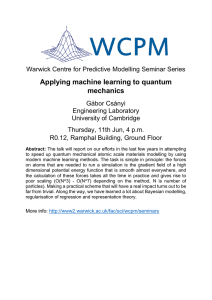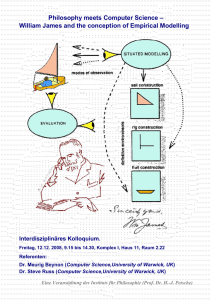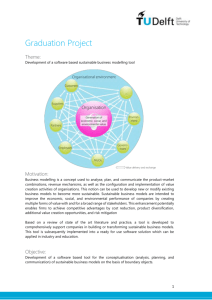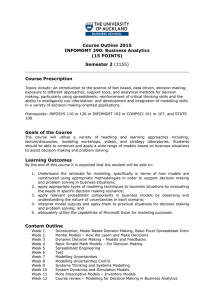Dr. Steve Russ
advertisement
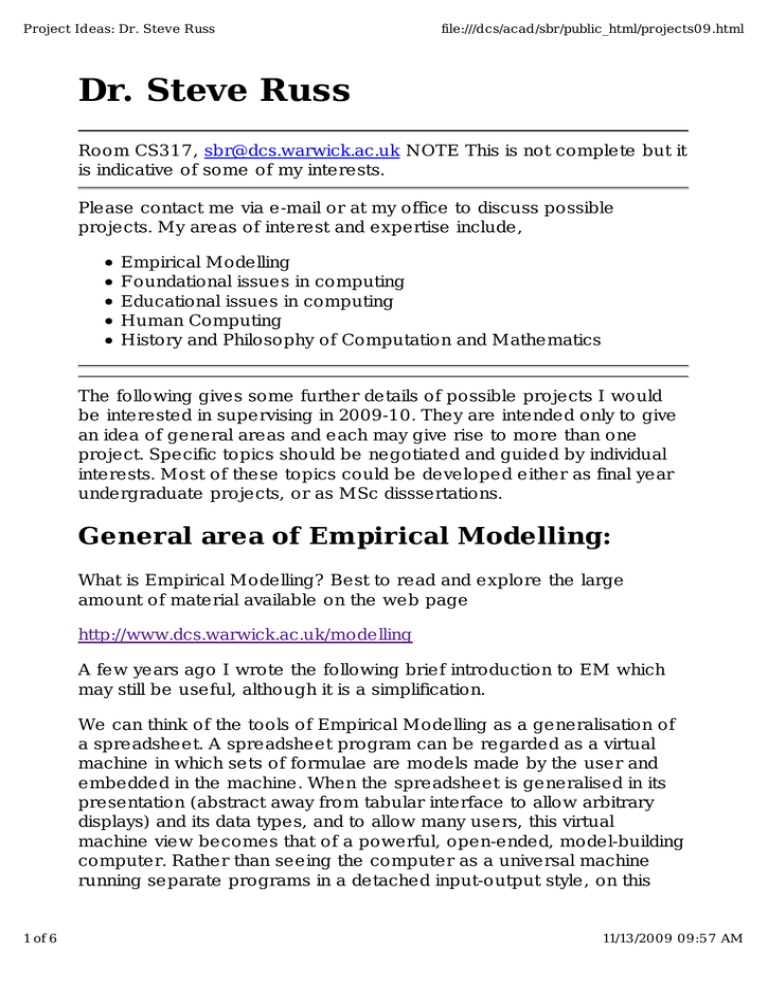
Project Ideas: Dr. Steve Russ file:///dcs/acad/sbr/public_html/projects09.html Dr. Steve Russ Room CS317, sbr@dcs.warwick.ac.uk NOTE This is not complete but it is indicative of some of my interests. Please contact me via e-mail or at my office to discuss possible projects. My areas of interest and expertise include, Empirical Modelling Foundational issues in computing Educational issues in computing Human Computing History and Philosophy of Computation and Mathematics The following gives some further details of possible projects I would be interested in supervising in 2009-10. They are intended only to give an idea of general areas and each may give rise to more than one project. Specific topics should be negotiated and guided by individual interests. Most of these topics could be developed either as final year undergraduate projects, or as MSc disssertations. General area of Empirical Modelling: What is Empirical Modelling? Best to read and explore the large amount of material available on the web page http://www.dcs.warwick.ac.uk/modelling A few years ago I wrote the following brief introduction to EM which may still be useful, although it is a simplification. We can think of the tools of Empirical Modelling as a generalisation of a spreadsheet. A spreadsheet program can be regarded as a virtual machine in which sets of formulae are models made by the user and embedded in the machine. When the spreadsheet is generalised in its presentation (abstract away from tabular interface to allow arbitrary displays) and its data types, and to allow many users, this virtual machine view becomes that of a powerful, open-ended, model-building computer. Rather than seeing the computer as a universal machine running separate programs in a detached input-output style, on this 1 of 6 11/13/2009 09:57 AM Project Ideas: Dr. Steve Russ file:///dcs/acad/sbr/public_html/projects09.html view the computer, together with a script of definitions expressing dependencies, becomes like a single artefact. Important here to think of the computer as a physical device rather than an abstract one with many potential i/o devices which allow experience of the model to be compared with experience of the domain being modelled. Often such experience of the model must be mediated by the use of metaphor.For example, a slider bar may represent (and mediate) the re-definition of an observable to have a larger or smaller value. Such an artefact has many of the qualities of an instrument - both when the human user is experimenting to ensure reliability, and when she is engaging with the artefact to exhibit desired behaviours and to gain new knowledge. It is an artefact which is both electronic and cognitive because it may contain explicit knowledge, and owing to the quality of interaction possible, it may also embody tacit knowledge gained through experience. This view of the computer suits applications which need to combine human and automated processes in a flexible and intimate fashion. Empirical Modelling therefore has three key concepts: observables (corresponding to variables in the 'spreadsheet'), dependencies (like formulae in spreadsheet, and automatically maintained) and agents - i.e. humans or devices that can intervene to change values and formula 'on the fly' to imitate or deal with unpredictable/unforeseen changes. These concepts run through the whole work from an initial analysis of domain or application to the tools we use (various in-house notations). Numerous third year projects using Empirical Modelling techniques have been undertaken in recent years - many of them very successful. Recently I have supervised ones on ant behaviour, how people avoid collisions with each other, a coaching aid for basketball, modelling an ancient Greek battle, enlarging a railway model with a physical model railway, and modelling planimeters.. Ones below are topics on which I have, or have had, specific interests. Experience has shown that the best projects arise from topics that students are already knowledgeable about, or for which they are already highly motivated. If you have an idea for a possible project using EM, come and discuss it. Format Exchange A common requirement now is to convert a given source (say text and images) into a variety of target format styles. For example, in preparing taught course material it is convenient to have a version for hard copy, 2 of 6 11/13/2009 09:57 AM Project Ideas: Dr. Steve Russ file:///dcs/acad/sbr/public_html/projects09.html a version for OHP slides and a version for the web. Broadcasting companies have a similar, but much greater challenge in (say) preparing a news story for digital terrestial TV, for web page delivery (with WAP compatible variants), for cable/satellite TV (with different format requirements) etc, and here audio files and video must be included. Clearly there are many dependencies in such a format exchanging environment. It must also be capable of changing rapidly and responding to on-line modification or up-date. For these reasons it might be a good application of EM methods. However, there will be many challenges for anyone taking this up since it would breaking new ground - there have so far been few EM projects taking text manipulation seriously where there is a need to respond to the text itself, and its 'meaning' as separate observables. I would expect the product of such a project to be something fairly simple showing the possibility in principle of applying EM methods successfully to this application. The production of module material in a variety of user-defined formats would probably make a good initial goal. Car Parking Simulator Learning to park a car close to optimally usually takes a good deal of practice and acquiring the 'higher order' skill of transferring the skill across makes and styles of cars takes even longer. The skill consists of manipulating steering wheel and movement in response to key observations of bonnet, other cars, rear windscreen, street furniture etc. It is therefore rich in observations and dependencies, requiring also a certain amount of experiment in the context of a developing bank of experience. All these aspects of the skill make it a good candidate for the use of EM principles and tools. The product of the project might be a model running on three workstations representing front, side and rear views from driver's seat together with a physical steering wheel and appropriate computer-based vehicle model. Again this would be challenging in various ways. There are some 3d-modelling tools and the tools have a distributed version which has been used in many projects now. But interfacing a steering wheel would be a new technical challenge which would have to be addressed in the project. Business Applications We have two or three research students in the EM group working on business applications. These range from financial modelling through 3 of 6 11/13/2009 09:57 AM Project Ideas: Dr. Steve Russ file:///dcs/acad/sbr/public_html/projects09.html business process re-engineering to decision support systems. There has also been a good deal of work recently on time-tabling and scheduling applications. Part of a restaurant manager system has been built to represent the dynamic time-tabling problem that arises in a restaurant when there are a number of existing bookings for tables which are then added to or cancelled during the evening. Tables may need to be put together for some bookings. Thus the requirements and the resources for satisfying demands may be changing throughout an evening. The current scenarios for the evenings bookings can be animated in the system by the manager in order to help make decisions about incoming requests. This is a very simple system which could be developed in numerous ways. There are a huge number of applications for business-oriented projects - supply-chain models, business simulations, comparison with conventional tools, group DSS models. logistics etc. If interested in this area of application you should come and discuss the possibilities with me. Modelling a Physical Environment The objective of this project is to develop a computer-based environment in which to organise our experimental 'common sense' knowledge of physical objects, and to simulate some of the typical behaviours of such objects. In particular a possible goal, for example, might be to build a system for the display of a furnished room in which the furniture can be introduced and moved in a fashion faithful to the physical properties of such a context. This would be an extension of an existing model (from previous projects) which uses a novel approach to the knowledge representation. This is the 'empirical modelling' approach developed in recent years by a group at Warwick. It is likely that there will several projects in this area, and that anyone doing this project would be part of a group using empirical modelling methods. A faithful machine model of some aspects of physical object behaviour is the main objective. Another domain would be the objects needed for physics experiments in mechanics at school level (e.g. levers, pulleys, springs etc). It might also be possible to take some simple mechanism (such as a lock, a pendulum clock, a door) amd simulate its behaviour in detail. An Agent-Oriented Tutorial System 4 of 6 11/13/2009 09:57 AM Project Ideas: Dr. Steve Russ file:///dcs/acad/sbr/public_html/projects09.html The objective of this project is to build an environment which will assist a student learning elementary linear algebra. In previous years various tutorial systems have been attempted which have tended to be over-ambitious. This system would have a limited domain and be making use of a novel approach for the knowledge representation. This is the 'empirical modelling' approach developed in recent years at Warwick. It is likely that there will several projects using these methods, and that anyone doing this project would be part of a group. The specific task of the project would be to model the domains of vector spaces, linear mappings and matrices in a way which respects the semantics of these objects at different levels of abstraction. For example, a vector of R^3 may be viewed as a localised physical displacement, or a class of displacements characterised by a triple of distances from given axes, or as a new algebraic object satisfying certain axioms. The system would have 'agents' corresponding to these different views throughout the development of the theory, allowing the selection of the level of abstraction at any stage, without re programming the entire model. A key feature of the tutorial system will then be to exploit this model by proposing sequences of interactive 'experiments' which motivate the definitions, illustrate the results, and help to explain the proofs. The level will be appropriate to a 1st year 'Maths for CS' course. An interface between extensions of existing notations and a tool like Mathematica would need to be built. General area of historical topics: I would be interested in supervising projects on a wide range of topics in the history of theoretical computer science: languages, algorithmic methods, data representation, modelling etc. If you are interested, and have an idea you would like to discuss, then e-mail me to arrange a time to meet. A Translation Assistant Contrary to the impression that may be given by dictionaries the occurrence of words or phrases in different natural languages with exactly equivalent meanings is rather rare. This is one of the reasons why translation is difficult. The problems may be multiplied considerably if the source text is historical and uses terms which have changed their meaning, perhaps in different ways, in both the source language and the target language. The human translator may need to keep track of a large amount of data (lexicons, commentary, usages in other authors 5 of 6 11/13/2009 09:57 AM Project Ideas: Dr. Steve Russ file:///dcs/acad/sbr/public_html/projects09.html and contexts, special problems etc) and be able to access the data in a wide variety of ways. The aim of this project would be to design and construct some suitable programs which would offer a flexible range of facilities to support a human translator. The project might suit someone with an interest in the problems of translation and the challenge of building a system where the requirements do not fit any preconceived pattern. Establishing an appropriate set of (modifiable) requirements will form a significant part of this project. 6 of 6 11/13/2009 09:57 AM
